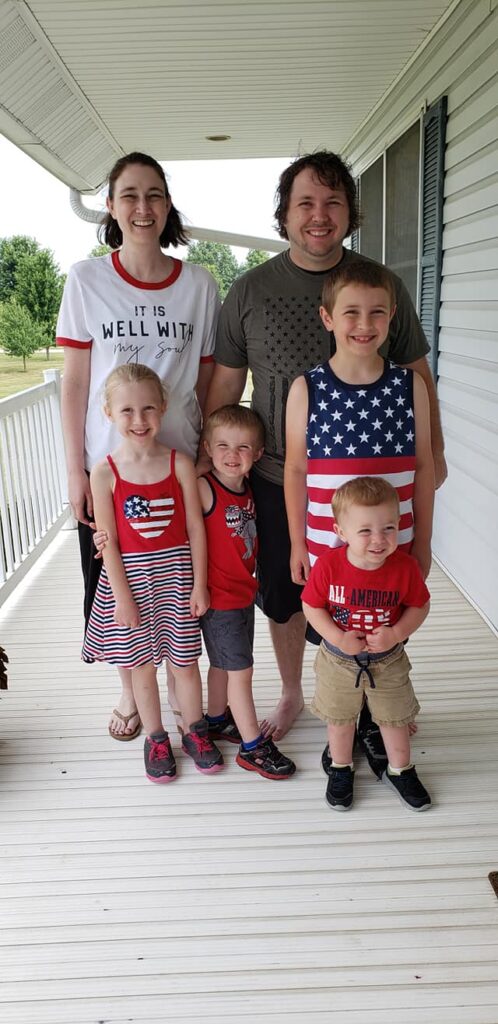When I had blood in my stool as a thirty-four-year-old mother of four young kids, I assumed it was hemorrhoids or a tear from giving birth. Something minor. Even after searching online, I hadn’t thought cancer was a legit cause for my bleeding.
During my past years working in registration at a hospital, I could spot a colonoscopy patient a mile away. They always had a driver, often acted a little grouchy from the horrible prep, and were fifty years old because that was the age doctors recommended getting a colon screening. After I became a trying-not-to-be-grouchy colonoscopy patient, the doctor found the truth. There was a malignant tumor growing inside me, and the biopsy confirmed I had rectal cancer.
Due to my young age, the doctors recommended genetic testing. Every test was negative. The cause of the cancer wasn’t hereditary, meaning my kids needed no immediate testing, and we weren’t concerned about genetic-related cancers for them. They are recommended for a colonoscopy screening at twenty-four years old, ten years sooner than my age of diagnosis. More and more people under fifty years old were getting diagnosed with colorectal cancer, and now the screening age has been lowered to forty-five.
Many healthcare professionals commented on my age throughout my journey. “Rectal cancer? But you’re so young!” Almost every time I went in for a test or appointment, someone would mention that they had never seen someone with my diagnosis at my age. If the evidence hadn’t been so clear, I would’ve started to doubt the diagnosis myself. As a young adult with cancer, all minds went to reproductive health. Things got personal fast.
“You already have four kids. Do you want more? Because this radiation treatment is going to zap everything down there. Within the next month or two, you’ll be going through menopause.” The doctors offered to put me on estrogen or freeze my eggs in case I wanted to try to get pregnant again, but I opted to skip that treatment. I accepted my four biological children as the only ones I would birth and said a short prayer, thanking God for the children I had.
A month later, the doctors’ words proved correct. My reproductive years ended as radiation sent me into a medically induced, dramatic menopause full of crazy hormones and hot flashes. Memes about women twenty years older than me were hilarious as I related to the jokes about needing a fan in the middle of winter. It’s still strange when I go in for tests at the hospital and I have to give the date of my last menstrual cycle. The tech will raise her eyebrows at me until confirming the information with my medical chart.
One of the most challenging things during my cancer treatment was missing my four kids, ages 8, 6, 3, and 1. I missed them when they were home because I wasn’t physically able to care for them, being on strong medicine for pain and nausea. That’s when a tough decision had to be made. I would miss them more if they were gone, but they needed a loving and capable adult.
The best thing for our kids would be to go to Grandma’s house during my chemo weeks. I missed them every other week during my three months of chemotherapy. I was blessed for my children to stay with my family. It helped me mentally and spiritually to focus on the good that God gave me such as my mom caring for my kids or people giving our family meals.
Celebrating the end of chemotherapy is a dilemma in itself. I was happy to be done, but I knew I wasn’t in the clear. Scanxiety would come and go with each hospital test after the cancer treatment ended. Rectal cancer is known to metastasize to the liver or lungs, so my scans specifically looked at the remainder of my colon and those two organs.
A year after my chemotherapy began, I had a routine follow-up CT scan. Two of my doctors called me the next day, noticing a spot on my lung. We were sure my cancer had spread. I was quickly scheduled for a biopsy, and I immediately turned to God to ask for His overwhelming peace.
The report concluded that my cancer had not spread (Yay!), but I had new primary lung cancer (Ugh!). This type of cancer is typically found in people over sixty-five years old, most of whom have smoked for several years of their lives. How was I, a young nonsmoker, getting cancer? Well, it’s another trend that lung cancer is decreasing overall, except in young nonsmokers. Thankfully, it was caught early at Stage 1.
God blessed me by finding this second cancer that could’ve been more deadly if not caught so early.
Within a week, I had surgery to remove a lobe from my lung. My kids made me cards with cute rainbows and stick figures, calling me the best mom ever, and my mom watched them for me again. After surgery, the tests showed my cancer was fully removed, and I was placed on another routine follow-up schedule.
For both colorectal and lung cancers, scientists and doctors are unsure why they are increasing in younger otherwise healthy people. I’ve been added to those statistics. Cancer is different for everyone, and I’m still surviving each day, knowing that it could recur or I could get another primary cancer.
However, I look back and see how much I’ve grown emotionally and spiritually over these last few years. I’ve learned empathy for those in pain. I’ve appreciated the time I get with my kids. Mostly, I’ve seen God’s blessings and decided to encourage others by sharing my story.
By : Amy Larry

